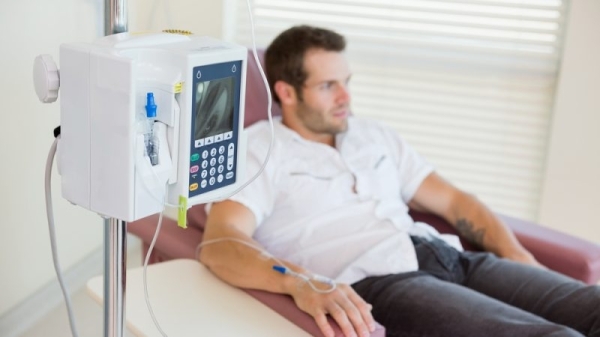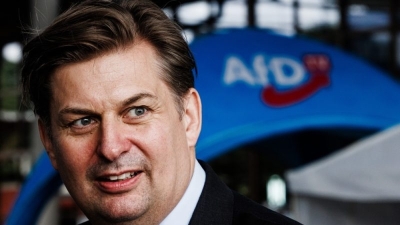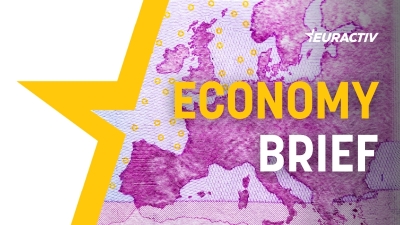Slovakia trailing Visegrád 4 in novel cancer medicines access

Research published in the journal of the European Society for Medical Oncology highlights diverging access to novel cancer treatments in the Visegrád Group (V4) of countries. Euractiv spoke with Petra Szilágyiová, co-author of the study and market access lead of MSD Slovakia.
A total of 124 indications of 51 cancer medicines with marketing authorisation by the European Medicines Agency (EMA) in 2011-2020 were included in the report “Access to novel cancer medicines in four countries in Central and Eastern Europe in relation to clinical benefit,” which were followed up until 2022.
The aim was to analyse access to novel cancer medicines and clinical benefits in Slovakia, Czechia, Poland, and Hungary, assessing reimbursement status, time to reimbursement, and the magnitude of clinical benefit.
“The centre of our focus should be the patient and their recovery,” Szilágyiová told Euractiv. “Our ambition is for oncology patients in Slovakia not to view cancer as a fatal disease but as a chronic condition.” he said, adding: “Ultimately, this will be beneficial for us as a society both economically, as more cured patients mean lower expenditures on social care and impact on the state budget.”
With the increasing number of medicines, a prioritisation of those with substantial clinical benefits is necessary for the financial sustainability of healthcare systems.
To address the rising number of cancer medicines, the European Society for Medical Oncology launched a Magnitude of Clinical Benefit Scale (ESMO-MCBS) – a tool to anticipate clinical benefit based on available data and evaluate value in order to efficiently prioritise access to beneficial medicines and save resources.
The ESMO-MCBS scale grades curative therapies from A to C, where A and B present a substantial clinical benefit. For non-curative therapies, the scale goes from 1 to 5, where 4 and 5 indicate a substantial magnitude of clinical benefit.
Slovakia’s poor reimbursement rate
Out of the 124 indications analysed, 65 had substantial clinical benefits, according to ESMO-MCBS, and 59 had a non-substantial clinical benefit.
Slovakia reimbursed only 19% of indications, compared to Hungary’s 40%, Poland’s 51%, and Czechia’s 64%.
All three countries had a similar proportion of reimbursed immunotherapies and targeted therapies, while Slovakia only had one indication of an immunotherapy reimbursed.
Waiting times for reimbursement were defined from EMA market authorisation to national reimbursement approval. The waiting times for reimbursement are accompanied by extensive spans across individual indications. The minimum/maximum waiting time in months was 13/70 in Czechia, 2/76 in Hungary, 12/74 in Poland, and 9/90 in Slovakia.
In Slovakia, the median waiting time for indications with a substantial clinical benefit (44 months) was more than twice as long as for non-substantial clinical benefit indications (20 months).
Reasons for low reimbursement levels
The study highlights three main reasons for the low reimbursement levels in the four CEE countries.
First, the swift development of new medicines improves patient outcomes, but ensuring access to all novel treatments proves to be a challenge for healthcare systems.
Second, the prices of novel cancer medicines are continuously increasing. Third, absolute spending on cancer medicines in Czechia, Hungary, Poland, and Slovakia is below the EU average.
Limited overall healthcare spending should, however, motivate investments in novel cancer medicines with substantial clinical benefits and proven value.
Quality-adjusted life years
Szilágyiová elaborated on the fourth reason for Slovakia’s access being the worst in the V4 – the quality-adjusted life years (QALY).
QALYs measure both the impact of diseases on quality of life and the cost-effectiveness of treatments. They help allocate healthcare resources by balancing the benefits of treatment against its costs.
“In comparison to other countries, Slovakia had a relatively low threshold value level. The lower limit was 24 times the average monthly wage at that time (€744.50), and the upper limit was 35 times,” said Szilágyiová.
Medicines below the lower threshold value could have been included in the categorisation list for reimbursement; those above the threshold were not, and those between were only conditionally categorised.
“Slovakia in 2020 had the 1 QALY threshold around €35,000. In Czechia, they applied the World Health Organisation’s method, used e.g. in Poland and Latvia, of calculating QALY as three times the GDP per capita. This amounted to approximately €45,000.”
The lower threshold means more novel treatments are unavailable for reimbursement due to the cut-off.
Legislative amendment bringing improvements
In August 2022, a legislative amendment came into effect with the goal to improve access and streamline the process of approving new treatments. It also adjusted the calculation of QALY value to GDP and increased the threshold value.
“Before the amendment entered into force during the monitored period (July 2021 – August 2022), there were 57 indications categorised in the list of drugs for reimbursement, including 19 oncological indications. After the amendment (September 2022 – October 2023), the total number of indications increased by 28%, which represents 73 indications, including 42 oncological and 16 orphan/advanced therapy medicinal products.”
Despite the positive steps in the right direction, access to novel treatments remains a challenge for the Slovak health system, which still needs to catch up with the EU countries.
“The contribution of this amendment is significant, but in the interest of the patient, we cannot remain satisfied, and we need to continue further in this established trend,” Szilágyiová remarked.
[By Filip Áč, Edited by Vasiliki Angouridi, Brian Maguire | Euractiv’s Advocacy Lab]
Read more with Euractiv




